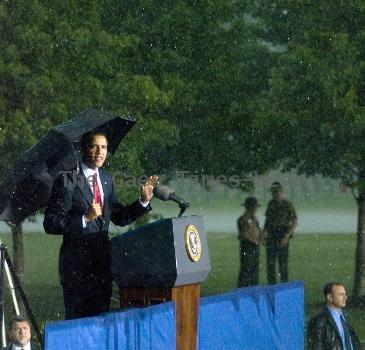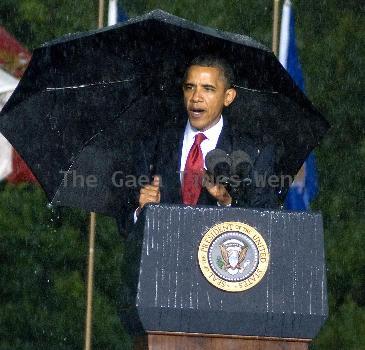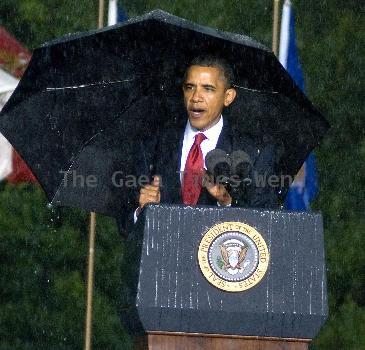BP shares fall sharply in London as US political pressure on Gulf spill grows
By Jane Wardell, APThursday, June 10, 2010
BP shares plunge on oil spill fallout fears
LONDON — The Gulf of Mexico oil spill risked turning into a trans-Atlantic diplomatic rift Thursday after U.S. threats to have BP fork out billions more for the disaster caused a precipitous slide in the blue-chip’s stock, hurting retirement savings for millions of Britons.
The stock dropped 9.3 percent to 355 pence ($5.18) in the morning session as analysts said it was increasingly likely that the company would postpone the payment of dividends to shareholders.
The share slide has since April almost halved BP’s market value to 69 billion pounds ($101 billion), costing it the spot as Britain’s biggest company — and some worry it could become a takeover target for upstart firms in Asia. BP said there was no reason for the stock drop, stressing its strong finances.
Because of the rising hysteria, Cameron is expected to discuss the issue with Obama on a routine scheduled telephone call over the weekend.
British lawmakers want Cameron to stress the blue chip company’s critical role in the national economy — some 18 million Britons hold shares in the company in one form or another, many through their pension funds.
“I would like to see a bit of cool heads rather than endlessly buck-passing and name-calling,” said London Mayor Boris Johnson. “When you consider the huge exposure of British pension funds to BP it starts to become a matter of national concern if a great British company is being continually beaten up on the airwaves.”
Cameron and his Foreign Secretary William Hague, who are both out of the country on business trips, took a conciliatory stance. In Afghanistan, Cameron said he understood “the U.S. government’s frustration because it is a catastrophe for the environment.”
The politics of the spill crossed the Atlantic on Thursday, with London Mayor Boris Johnson expressing concern about the “anti-British rhetoric that seems to be permeating from America.”
“You attack the dividend and you are attacking millions of British pensioners,” said Tom Watson, a member of the opposition Labour Party who planned to officially table a motion in the House of Commons supporting BP.
BP shareholders receive a dividend payment every quarter. It has held steady at 14 cents per share, worth a total of around $10 billion, since July 2008. BP is due to announce details of its second quarter payment with its earnings report on July 27, but it can make changes before then.
There are also worries that Obama, who earlier this week suggested he would fire BP CEO Tony Hayward if he could, will tap into U.S. anger as oil-coated pelicans and turtles continue to wash up on devastated beaches and impose longer term sanctions that would prevent BP from bidding for new contracts in the United States, where it is the biggest oil operator.
But markets were also beginning to heed warnings from analysts who said Wednesday’s 15.8 percent sell-off of BP shares in New York was an overreaction — the company has lost around half its market value since the spill began with an April 20 explosion at the Deepwater Horizon rig that killed 11 people.
In London, the stock recovered some ground after dropping as much as 11 percent at the open to a 13-year low. It closed down 6.7 percent at 365.5 pence ($5.35).
In New York, the stock opened 9.8 percent higher at $32.05, clawing back some of the losses from a 15.8 percent rout on Wednesday.
BP said Thursday that it was capturing more oil in a containment system as it reported that costs so far had risen to almost $1.5 billion — a hefty amount but still manageable given the company turned a $16 billion profit last year.
Hayward has consistently declined to speculate on the final bill, but in an attempt to calm investors on Thursday, the company pointed to its supportive additional cash flow from other projects, its strong debt to equity ratio and its proven reserves. It had more than 18 million barrels of proven reserves and 63 billion barrels of resources at the end of 2009.
The share price falls in London and New York have wiped out around half the company’s market value.
Tags: Barack Obama, Dividends, England, Europe, London, New York, North America, Oil spill, Ownership Changes, Personnel, United Kingdom, United States, Western Europe








John